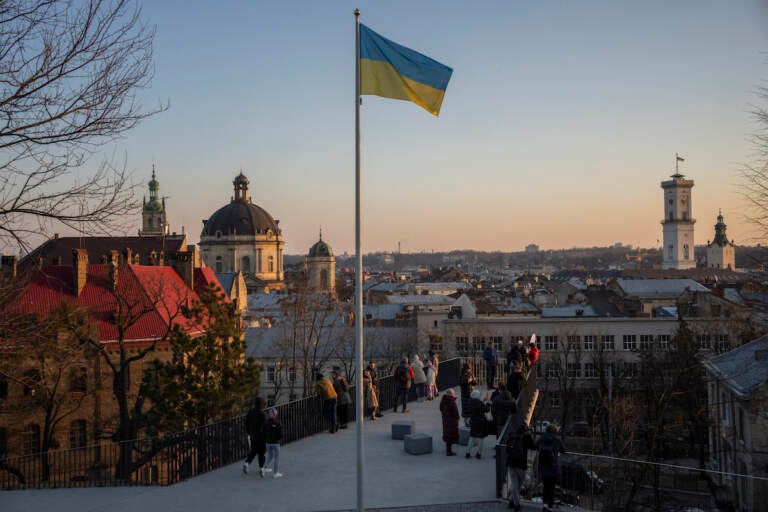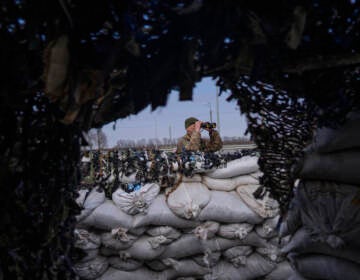Rocket attacks hit Ukraine’s Lviv as Biden visits Poland
The powerful explosions Saturday frightened a city that has been a haven for hundreds of thousands of people fleeing other parts of Ukraine.

People gather in a vantage point that overlooks the city of Lviv, western Ukraine, Saturday, March 19, 2022. (AP Photo/Bernat Armangue)
Several rockets struck the western Ukrainian city of Lviv on Saturday while President Joe Biden was visiting the capital of neighboring Poland. The powerful explosions frightened a city that had been a haven for hundreds of thousands of people fleeing the Russian assault on other parts of Ukraine.
Thick black smoke rose from the first blast site on the city’s northeastern outskirts for hours before a second set of explosions was reported.
Lviv has become a humanitarian staging ground for Ukraine, and the attacks could further complicate the already challenging process of sending aid to the rest of the country.
The regional governor, Maxym Kozytsky, said rockets hit an oil facility and a factory both linked to the military. Both are in areas that include residences. Earlier Saturday, Kozytsky said on Facebook there had been at least four explosions and at least five people were believed to be injured.
Lviv Mayor Andriy Sadovyi said the second attack did significant damage to an unspecified “infrastructure object.”
The explosions happened while Biden was in Poland’s capital, Warsaw, about 340 kilometers (210 miles) away, where he visited with Ukrainian refugees, delivered harsh words concerning Russian President Vladimir Putin and warned that Europe must steel itself for a long fight against Russian aggression.
Lviv had been largely spared since Russia’s Feb. 24 invasion of Ukraine, although missiles struck an aircraft repair facility near the international airport a week ago.
The back-to-back attacks on Saturday brought a chill to residents and displaced Ukrainians who had seen Lviv as a relatively safe place to rebuild their lives. Home to about 700,000 people before the invasion, the city has absorbed many more.
In a dim, crowded bomb shelter under an apartment block a short walk away from the first blast site, Olana Ukrainets couldn’t believe she was having to hide again. She had fled to Lviv from Kharkiv, one of the most bombarded cities of the war.
“We were on one side of the street and saw it on the other side,” the 34-year-old IT worker said of the blast. “We saw fire. I said to my friend, ‘What’s this?’ Then we heard the sound of an explosion and glass breaking. We tried to hide between buildings. I don’t know what the target was.”
Ukrainets said she had felt relief after fleeing to Lviv, to the point where air raid sirens no longer caused fear.
“I was sure that all these alarms wouldn’t have any results. I want to say that sometimes when I heard them at night I just stayed in bed,” she said. “Today I changed my mind, and I should hide every time. … None of the Ukrainian cities are safe now.”
The day’s events were enough to make some people in Lviv prepare to move again, said Michael Bociurkiw, a senior fellow with the Atlantic Council who is in the city. “I saw some Kyiv cars being packed up,” he said. It was a significant turn in a week where the city had begun “roaring back” to life after weeks of war, he said.
He believes the city could remain a target, noting that Lviv was the birthplace of Ukrainian nationalism. “It’s getting closer,” he said of the war.
Some witnesses were in shock.
“It was really close,” said Inga Kapitula, a 24-year-old IT worker who said she was 100 or 200 meters (yards) away from the first attack and felt the blast wave. “When it happens, your body’s in stress and you’re super calm and organized.”
WHYY is your source for fact-based, in-depth journalism and information. As a nonprofit organization, we rely on financial support from readers like you. Please give today.






